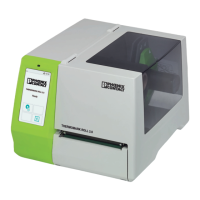
Do you have a question about the Phoenix Contact THERMOMARK ROLL 2.0 and is the answer not in the manual?
| Printing Technology | Thermal transfer |
|---|---|
| Print Resolution | 300 dpi |
| Connectivity | USB, Ethernet |
| Operating System Compatibility | Windows |
| Weight | 9.3 kg |
| Power Supply | 100-240 V AC, 50/60 Hz |
| Core Diameter | 76 mm |
| Operating Temperature | 5°C to 40°C |
| Storage Temperature | -20°C to 60°C |
| Supported Label Materials | labels |
| Humidity | 20% to 85% (non-condensing) |
Symbol indicates hazards leading to personal injury. Severity shown by signal words.
Manual for users familiar with electrical machine safety concepts and dangers.
Steps for unpacking the printer, checking for damage, and requirements for installation location.
Illustration and description of the printer's main components and their functions.
Details on device connections, including power switch, sockets, and specific mains cable connection.
Steps for connecting the printer via USB, including driver installation and software setup.
Procedures for setting up WLAN and Ethernet connections for network communication.
Steps for inserting material rolls, margin stop adjustment, and basic printing readiness.
Instructions for inserting Leporello label stacks and feeding them into the printhead.
Guide on how to correctly insert the ink ribbon for thermal transfer printing.
How to perform printing and use marking software to create print jobs for the printer.
Overview of the touch screen interface for basic printer settings and operations.
Explains the icons available on the printer's start page and their functions.
Details the menu structure for printer operations, including settings and storage access.
How to adjust heat level, print position horizontally/vertically, and printing on request.
Configuration for interfaces, network services, and printer behavior in case of errors.
Settings for language, country, time, date, display, and performing a test print.
Settings for PIN protection, FTP login passwords for printing, storage, and firmware updates.
Options for firmware updates, saving/loading settings, resetting, and setting cleaning intervals.
Links to video guides for various printer operations and maintenance tasks.
Instructions on accessing and using the printer's web interface for configuration and status monitoring.
How to manage and transfer files using FTP for direct printing and firmware updates.
Procedures for accessing storage media and updating the printer's firmware using FTP.
Information on available cutter and perforator accessories, mounting, and blade handling.
Instructions for physically mounting the cutter or perforator accessory onto the printer.
Safety warnings and steps for cleaning the cutter or perforator assembly.
Detailed instructions on how to remove and reinsert the cutter blades for cleaning or replacement.
Guide on mounting the external media hub for larger media rolls and inserting material.
General instructions for cleaning the printer, including protection and printhead cleaning frequency.
Specific steps for cleaning the printer's printhead using alcohol or a cleaning stick.
How to clean or replace the pressure roller to maintain print quality and transport.
Tables listing common problems, causes, remedies, and page references for solutions.
Tables listing common error messages, their causes, and recommended remedies with page references.
Guidelines for device repairs, transportation, storage conditions, and proper disposal.
Lists product types, accessories, ink ribbons, and materials with order numbers and packaging.
Lists various materials like terminal block markers, wire marking, and shrink sleeves with order details.
Details on labels for equipment, sensitive components, plant marking, and their order information.
Comprehensive technical specifications of the printer, including printhead, material, and dimensions.
Details on printer interfaces, supported software, and operating parameters like voltage and temperature.
Documentation regarding compliance with FCC, ICES, GPL code, and EU directives.
Statement of compliance with key EU directives (RoHS, EMC, Low Voltage).